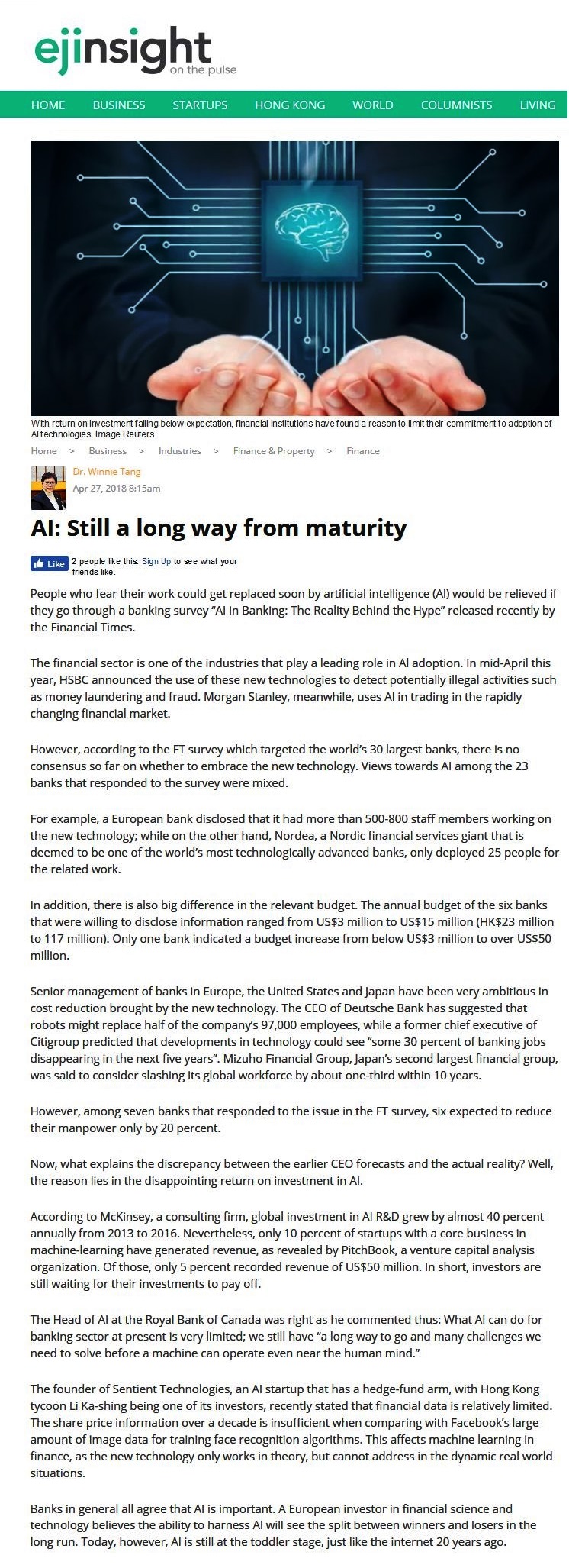網上版請按此

AI: Still a long way from maturity
People who fear their work could get replaced soon by artificial intelligence (Al) would be relieved if they go through a banking survey "AI in Banking: The Reality Behind the Hype" released recently by the Financial Times.
The financial sector is one of the industries that play a leading role in Al adoption. In mid-April this year, HSBC announced the use of these new technologies to detect potentially illegal activities such as money laundering and fraud. Morgan Stanley, meanwhile, uses Al in trading in the rapidly changing financial market.
However, according to the FT survey which targeted the world's 30 largest banks, there is no consensus so far on whether to embrace the new technology. Views towards AI among the 23 banks that responded to the survey were mixed.
For example, a European bank disclosed that it had more than 500-800 staff members working on the new technology; while on the other hand, Nordea, a Nordic financial services giant that is deemed to be one of the world's most technologically advanced banks, only deployed 25 people for the related work.
In addition, there is also big difference in the relevant budget. The annual budget of the six banks that were willing to disclose information ranged from US$3 million to US$15 million (HK$23 million to 117 million). Only one bank indicated a budget increase from below US$3 million to over US$50 million.
Senior management of banks in Europe, the United States and Japan have been very ambitious in cost reduction brought by the new technology. The CEO of Deutsche Bank has suggested that robots might replace half of the company's 97,000 employees, while a former chief executive of Citigroup predicted that developments in technology could see "some 30 percent of banking jobs disappearing in the next five years". Mizuho Financial Group, Japan's second largest financial group, was said to consider slashing its global workforce by about one-third within 10 years.
However, among seven banks that responded to the issue in the FT survey, six expected to reduce their manpower only by 20 percent.
Now, what explains the discrepancy between the earlier CEO forecasts and the actual reality? Well, the reason lies in the disappointing return on investment in AI.
According to McKinsey, a consulting firm, global investment in AI R&D grew by almost 40 percent annually from 2013 to 2016. Nevertheless, only 10 percent of startups with a core business in machine-learning have generated revenue, as revealed by PitchBook, a venture capital analysis organization. Of those, only 5 percent recorded revenue of US$50 million. In short, investors are still waiting for their investments to pay off.
The Head of AI at the Royal Bank of Canada was right as he commented thus: What AI can do for banking sector at present is very limited; we still have "a long way to go and many challenges we need to solve before a machine can operate even near the human mind."
The founder of Sentient Technologies, an AI startup that has a hedge-fund arm, with Hong Kong tycoon Li Ka-shing being one of its investors, recently stated that financial data is relatively limited. The share price information over a decade is insufficient when comparing with Facebook's large amount of image data for training face recognition algorithms. This affects machine learning in finance, as the new technology only works in theory, but cannot address in the dynamic real world situations.
Banks in general all agree that AI is important. A European investor in financial science and technology believes the ability to harness Al will see the split between winners and losers in the long run. Today, however, Al is still at the toddler stage, just like the internet 20 years ago.
Dr. Winnie Tang
Honorary Professor, Department of Computer Science, The University of Hong Kong